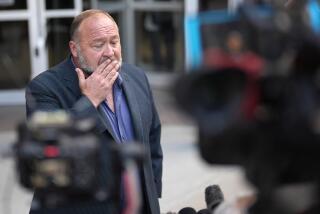Music Firm’s Source of Funds Under Scrutiny : Lack of Financial Records Hampers Investigation of Consolidated Allied Leases
- Share via
Over the last two years, Consolidated Allied Cos. and its 30-year-old president and owner, Kimball D. Richards, have spent millions attempting to establish the Santa Fe Springs-based music firm as a major player in the record industry.
The company filled a warehouse with expensive concert-staging equipment, such as amplifiers, speakers, microphones and stage lighting. It opened a state-of-the-art recording studio complete with a $137,000 jacuzzi room and a shark aquarium. It assembled a fleet of telephone-equipped automobiles--including a Rolls-Royce, a Mercedes limousine, a Porsche, a BMW and a $65,000 Ferrari that was given as a 21st birthday present to the company’s principal recording artist, Luis Cardenas, drummer for the Los Angeles rock group Renegade. Richards traveled all over the world--staying at the best hotels, eating in the best restaurants and riding in chauffeured limousines.
Flurry of Legal Activity
But Consolidated Allied’s spending spree came to a halt last month when its largest creditor, Los Angeles-based Union Bank, sued the company for fraud, alleging that the firm had obtained more than $7 million in financing on the basis of bogus financial statements.
That suit started a flurry of legal activity as Consolidated Allied’s other big creditors joined Union Bank’s effort to seize assets--primarily recording equipment. In response to the creditors’ requests, Superior Court Judge Ricardo A. Torres in Los Angeles appointed a receiver on Jan. 21 to take control of Consolidated Allied, and he dispatched court officers to secure the company’s offices, warehouse and recording studio.
Two weeks later, Consolidated Allied filed a petition seeking protection from its creditors under Chapter 11 of the federal bankruptcy code, and last Friday a bankruptcy judge in Los Angeles appointed a trustee to oversee the company.
Creditors have alleged in court documents that they advanced millions of dollars to finance so-called “leveraged leases” on recording studio equipment. Such leases are normally written by a commercial leasing agent and then so1818501217common process known as “factoring.”
Consolidated Allied is alleged to be responsible for repayment of all the leases, with current monthly payments totaling $700,000, according to court documents.
Creditors’ receiver David L. Ray said the court officers that were sent to Allied’s three facilities last month found recording equipment with a retail value of only $2.8 million secured by leases worth about $28 million. Ray alleged that in some instances it appears that several lenders may have advanced financing for the same piece of equipment.
“Some of the equipment (secured by leases) is not there,” Ray said, adding that creditors so far have been unable to find any current books and records of Consolidated Allied.
According to a number of former and current associates, Richards often said the principal source of Consolidated Allied’s funding was a multimillion-dollar trust fund set up for him by his father, former state Sen. Richard Richards (D-Los Angeles), 69, now a senior partner in the Los Angeles law firm of Richards, Watson, Dreyfuss & Gershon.
Investigation Launched
Kimball Richards insisted in an interview, however, that he had nothing to do with his company’s finances, but instead concentrated on creative aspects such as producing records and managing artists’ careers.
Information gathered by Consolidated Allied’s creditors and receiver has sparked the interest of law enforcement agencies.
Last week, the major frauds unit of the Los Angeles County District Attorney’s office launched an investigation of Consolidated Allied. It is also looking at Riviera Capital, a Huntington Beach-based commercial financing firm that wrote and placed most of Consolidated Allied’s equipment leases, it was learned.
Investigators said they are trying to find out how Consolidated Allied obtained the millions of dollars it spent, a task made difficult by the lack of financial records.
Richards claimed that all financing was handled by Riviera President Robert Bernfeld. “I haven’t the faintest idea how much money came into the company,” Richards said. “One thing I can tell you for sure is that I didn’t get it personally.”
In an interview Friday, Bernfeld and his attorneys called Richards’ statements “patently and totally false.” Bernfeld said his firm’s role has been “nothing more than financing the equipment.”
Bernfeld described his firm as a “medium-size commercial leasing company involved in financing professional broadcast and film equipment.” He added: “The way it works is, a customer comes to us and says they want to use some equipment in their business, so we pay the (supplier) for the equipment and lease it to the end user.”
In Consolidated Allied’s case, Riviera purchased recording equipment from a number of suppliers or manufacturers, leased it to Consolidated Allied and then sold the leases to other lenders at a discount, with Allied responsible for making the payments.
Bernfeld said the amount lent was about $20 million. (The total of $28 million due cited by Ray includes fees and interest paid over the life of the leases.) Bernfeld insisted that most of the money received from lenders was passed on by Riviera to the suppliers or manufacturers of the equipment that Consolidated Allied ordered.
He added that major financial institutions had carefully checked out Richards’ company before getting involved. “We were being backed by other commercial lenders that did their own due diligence and went down to the (Santa Fe Springs) facility and met Richards and checked everything there was to be checked,” Bernfeld said. The lenders then decided to buy Consolidated Allied equipment leases, he added, “and we would write them.”
According to court documents, Consolidated Allied’s secured lease creditors, in addition to Union Bank, include some of the nation’s biggest commercial finance companies--divisions of John Hancock Mutual Life Insurance, Great Western Financial, General Electric, First Interstate Bancorp, Sumitomo Bank, ITT and Xerox.
The lenders have claimed that they relied heavily on Consolidated Allied’s financial statements, which said the company had nearly $11 million in cash on hand. Union Bank’s civil suit alleges that Consolidated Allied said the cash was on deposit at the “Recording Artists’ International Credit Union.”
Credit Union Non-Existent
According to the lawsuit, however, after buying leases worth more than $5 million and granting Consolidated Allied an unsecured loan of $2.5 million, Union Bank discovered that the credit union did not exist and that the phone number given by the company to check the credit union account “in fact rang through to the premises maintained by Consolidated Allied.”
Bank officials declined to comment on the lawsuit.
According to Richards, the company’s financial statements were prepared by Bernfeld, whom he described as Consolidated Allied’s “vice president of business and finance.”
“The first time I ever saw (Consolidated Allied’s) financial statements was in a meeting with Union Bank on Jan. 5, (1987)” he said.
Bernfeld and his attorneys vehemently deny that he prepared the financial statements. None of the creditors has named Bernfeld or Riviera in their legal actions against Consolidated Allied.
And Riviera, which claims to be owed more than $2 million by Consolidated Allied, has joined three other creditors in seeking to put Kimball Richards in involuntary bankruptcy proceedings. According to a financial statement provided to lenders, a copy of which was obtained by The Times, Richards has claimed a personal net worth of $24 million.
According to Stephen Spector, one of Bernfeld’s attorney’s, Richards told a general meeting of creditors after the Union Bank lawsuit was filed that $5 million worth of equipment was in Chihuahua, Mexico, an additional $2 million worth was stolen last November and an unspecified amount is somewhere in Australia.
Equipment Removed
However, Richards said in an interview that, except for the equipment allegedly stolen, everything his company leased is still at its offices and warehouse.
According to Ray, the court-appointed receiver, several tractor-trailer loads of equipment was removed from Consolidated Allied’s Santa Fe Springs warehouse by Richards and Consolidated Allied employees two weeks ago, after the company had filed for protection from creditors under Chapter 11 of the federal bankruptcy code.
Under Chapter 11, a company is protected from seizure of assets by its creditors while management works out a plan to pay off its debts. In Consolidated Allied’s case, it effectively removed the receiver for the creditors from control of the assets. “We couldn’t prevent them from taking the equipment,” Ray said. “They just rolled the trucks up to the warehouse and started loading up stuff at night.”
Richards claims that the equipment taken from the warehouse two weeks ago belonged to Luis Cardenas and his rock group.
Also removed at the same time from the Santa Fe Springs location were two patrol cars used by a private security business operated by Consolidated Allied. The security firm is licensed by the state to provide bodyguard protection for the firm’s officers and recording artists as well as a 24-hour security patrol at its three locations.
The Los Angeles police, the California departments of Motor Vehicles and Consumer Affairs confirmed that they are looking into the operations of Consolidated Allied’s private security force, specifically why its patrol cars had state-issued “E” license plates normally reserved for official state and local government vehicles.
According to DMV investigator Gary Mitchell, “The papers submitted to obtain those plates were false. (Consolidated Allied) claimed that they were a (municipal) police department, and in fact they are not.”
Richards said “overzealous employees” may have obtained the license plates, adding that he did not oversee the company’s security operations.
More to Read
The biggest entertainment stories
Get our big stories about Hollywood, film, television, music, arts, culture and more right in your inbox as soon as they publish.
You may occasionally receive promotional content from the Los Angeles Times.










